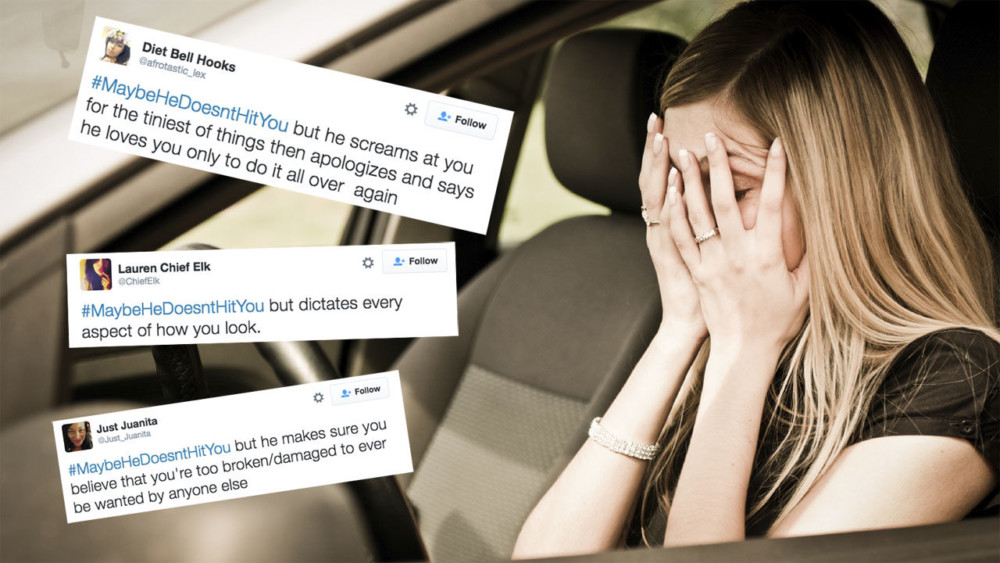By Heidi Stevens
Chicago Tribune
WWR Article Summary (tl;dr) The hashtag #MaybeHeDoesntHitYou was started in May by writer Zahira Kelly, and it quickly caught on. Now with the help of a graphic artist, the hashtag is on track to turn into something lasting and teachable for young people.
Chicago Tribune
Maybe he doesn’t hit you …
Those five words launched a campaign that brought thousands of people to social media to share their stories of life inside a relationship plagued by emotional abuse and power imbalance.
#MaybeHeDoesntHitYou but he tells you what friends you’re allowed to have
#MaybeHeDoesntHitYou but he threatens to kill himself when you muster up the strength to leave; so you stay and he manipulates you even more
#maybehedoesnthityou but he makes you feel unworthy of his love and attention
#maybehedoesnthityou but he says you should be grateful he doesn’t
Now the tweets are collected into a downloadable kit for schools, youth centers and anyone else who feels the need to spread awareness about unhealthy relationship dynamics.
The hashtag was started in May by writer Zahira Kelly, and it quickly caught on. A few weeks ago, Cincinnati-based graphic artist Maya Drozdz was approached by a teen services librarian friend who wanted to turn the hashtag into something lasting and teachable for young people.
Drozdz, 42, created a print-ready kit that contains bookmarks, a poster and flier with tear-off slips containing different #MaybeHeDoesntHitYou tweets. The 11-by-17-inch poster lists statistics about domestic abuse and provides a website and phone number for the National Domestic Violence Hotline.
“This kind of abuse is a very subtle experience,” Drozdz told me. “It’s easy to feel alone and feel like you’re just being too sensitive. Being confronted with other people’s stories is an initial step toward realizing you’re not alone.”
The hashtag uses “he,” but Drozdz (and several social media users) point out that abuse can come from women too. The campaign, ideally, will raise awareness across gender lines.
Three years ago, I interviewed psychotherapist Jill Murray, author of “But He Never Hit Me: The Devastating Cost of Non-Physical Abuse to Girls and Women” (iUniverse), about helping teenagers avoid dating abuse. I thought about her advice when I learned about this recent campaign.
“The most important thing you can teach (adolescents) is that love is a behavior, rather than a feeling,” Murray told me at the time.
“Love is the way somebody treats you all the time, not just when they feel like it,” she said. “You can point out behaviors and ask if they think that’s loving: This person calls you an idiot. Is that loving? This person puts you down. Is that loving? This person gets mad when you see your friends. Is that loving?
“When you’re a teen, you just hear, ‘I love you, I love you, I love you,’ and your heart is making all the decisions instead of your head,” Murray said. “When you start introducing logic, then you get them thinking, rather than just feeling.”
I think this campaign does the same.
“The adolescent me could have really used something like this,” Drozdz said. “When I think back through the early years of my trying to understand relationships, I didn’t have positive role models. I spent a long time learning some really unhealthy behaviors and seeking out unhealthy partnerships.
“Here I am, years later, a bona fide grown-up finally learning how to be assertive and healthy and have a 50/50 partnership with someone,” she continued. “I have a little sister, so I’ve always been the big sister. This is one of those moments when I’m trying to be a big sister for people I don’t know.”














































































































































































































































































































































































